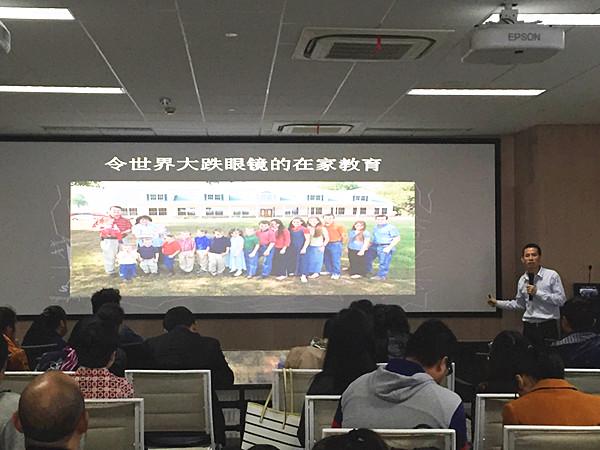In recent years a type of "Private School" has been emerging in many places in China; homeschooling. It has aroused discussions among many parents. Homeschooling is a type of educational method that is based on families with children educated mainly by their parents. Some Chinese Christian parents feel they have no other choice than homeschooling, because in the environment of atheism, how can the next generation continue the faith? For that reason, they have to pursue the path of homeschooling together.
On Oct 4-5, a homeschool workshop in Hangzhou provided a communication platform for parents who homeschool their children. About 30 families with children participated in studying.
In a lecture named "Non-professional Parents of Homeschooling," Teacher Xu, the keynote speaker, said that many parents had misunderstandings on homeschooling. They thought they didn't have enough knowledge, teaching skills, experience, spiritual life, and so on. These had all become the greatest obstacles of homeschooling. But education is not living in captivity preparing for life; education itself is life and work.
Xu mentioned the Moire Principle, which states that true education should be fun, relaxing with therapeutic effects, inexpensive, low-stress, and yet successful. The Moire Principle guides the parents to balance the development of every aspect of their children, including balancing the consolidation of the head, hands, the heart and health. Homeschooling parents could do the daily course arrangement for their children based on the Moire Principle. For example, their children could learn from a few minutes to several hours based on their maturity levels, with at least one hour of family or community service each day. This way they concentrate on the interests and needs of the children, setting examples in consistency, curiosity, and patience to experience with them.
Xu also reminded the nearly thirty families to present not to underestimate the children's self-educating abilities from God. He told everyone that the children's abilities to learn and explore are beyond the imagination of the adults, and that they only need the help and guidance of their parents. Throwing a child in school to receive the so-called specialized education too early would undermine the child's nature. The education at school is mostly spoon-fed, and such a method would destroy a child's natural desire for knowledge and exploration. The child would be restrained in the limited knowledge of textbooks.
In the Q&A section, some parents mentioned that they were worried they were not professional enough to carry out homeschool. Xu encouraged them that God gave the children to the parents, and He also gave parents the ability to raise the children. Parents would doubt their competence with the restraint and influence of the school education pattern, when actually they just brought the pattern of school back home. "Actually, homeschooling is not that complicated." Xu said, "It is the simplest and most natural living education."
A pastor who had been carrying on homeschooling for many years shared his comprehension and experience. He said that a child is like a ball of fire, and that if parents just fan the flames, the child would light up. However, in the traditional school teaching method, the child is like a bucket of water, and the teacher is the one with the ladle. The teacher would put just as much water as he has in the bucket, and in this way, the student would never be better than the teacher.
The pastor said that, before his child was facing problems from too much homework, stress and others in school. After searching for many methods and solutions, they eventually chose to homeschool. They took the child to museums, cultural centers, public welfare courses and so on. They would ask the child questions everywhere they went to activate his self-learning ability and creativity. "Anywhere is the classroom for studying," said the pastor.
Background Introduction:
Homeschooling is a unique teaching method that developed in the end of the 19th century and it flourished in the 1950s. Back then some middle-class families chose to homeschool their children when they realized the standardization and mechanization drawbacks of formal school education. Also out of the religious and security concerns, they would not send their children to schools. They helped their children to study at home, and focused more on their personalities, gifts, and interests. Based on these they chose appropriate teaching methods and learning points. Now there are more and more practitioners of homeschooling in mainland China.












